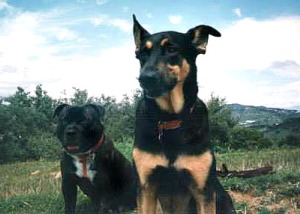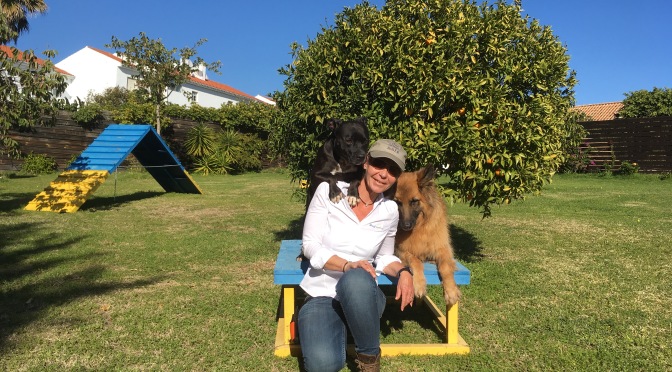Louise Stapleton-Frappell B.A. Hons. PCT-A. CAP3. CTDI. DN-FSG1. DN-CPCT2 Wow that’s a lot of letters and I recently added some more: PCBC-A! (Professional Canine Behavior Consultant – Accredited).
So why do I feel the need to continuously further my education in the field of force-free, rewards based, science based dog training?
I am sure that many of you are already aware that the field of dog training is as yet an unregulated industry. Whether you live in the USA, the UK or elsewhere, you will probably be surrounded by people calling themselves dog trainers and offering pet dog classes. Some of these individuals will have worked hard to continuously improve their skills and expand their knowledge in the field of rewards based, science based, force-free dog training. Unfortunately, there will be many more who have set up shop and are using techniques that are not only outdated but also potentially emotionally and physically harmful to the pets in their care.
I grew up surrounded by beautiful countryside and lots of animals. Border Collies, German Shepherd Dogs and Chow Chows were part of the family home. After studying for my Bachelor of Arts Honours Degree at the University of Leeds, I took my first teaching post at a school in Cartagena. This was soon followed by a move to Southern Spain where I added a beautiful German Shepherd x Doberman, Bess, to my family and thus began my passion for teaching dogs as well as people!

When I first started training Bess, ‘going to school’ wasn’t something dog trainers did. Most dog trainers were self-taught or carried out apprenticeships with those already working in the field. At that point in time, I had no intention of training professionally but I did want to train effectively and with my dog’s best interests at heart.

I was very fortunate as a local veterinarian put me in touch with a respected police dog trainer who passed on his knowledge and shared his love of the beautiful canines he worked with. The dogs were taught with enthusiasm, praise and lots of games. Manolo’s most repeated words to me at that time were “más, más!… She worked hard, reward her more, play more!” Bess loved to jump and so that is exactly what we encouraged her to do. She would happily fly up into the air to the sound of my jubilant ‘yay’! I didn’t know it then, but what we were doing was positively reinforcing the behaviour she had just carried out.

A gorgeous Staffordshire Bull Terrier, Samson, was soon added to my family and he was followed by my present family members, Tessa and Jambo. I continued to follow my love of teaching dogs and furthered my education in the world of dog training. I discovered the world of dog tricks and shared my passion with Jambo, who, at the age of just 16 months, became the first Staffordshire Bull Terrier to become a Trick Dog Champion. Jambo has since been aired on Talent Hounds TV in Canada and was also featured as a Victoria Stilwell Positively Story.
Manolo sadly passed away at a young age but I am sure that if he were with us today, he would have helped lead the way in promoting force-free training. I have been very fortunate as, unlike when Manolo was training, there are now many great educational courses and resources available that have allowed me to continue to build on my knowledge and further my education.
I believe that if you wish to do your best by those in your care, it is your obligation to make sure that the knowledge and skills you are sharing are based on the most up-to-date information available. We know so much more now about the way animals learn. We know so much more about how our interactions with them affect both their mental and physical wellbeing. There is no longer anything standing in our paths. We can find and attend courses; read up on the latest scientific findings; learn about operant and respondent conditioning; watch amazing instructional videos and webinars from some of the top people in our field who willingly spend their time creating informative, fun-filled educational presentations; we can attend workshops and seminars; we can follow the amazing studies into canine cognition; read books written by the ‘rock stars’ of our industry: Jean Donaldson, Pat Miller, James O’Hare, Ken Ramirez, Kay Laurence, Karen Pryor, Niki Tudge, Patricia McConnell. Victoria Stilwell, Denise Fenzi, Bob Bailey and many more.
I’m not saying that every dog trainer or pet industry professional needs to earn every credential there is, but I don’t believe there is any excuse for using out-dated punitive methods based on myths and old-wives tales about being the pack leader. Furthering your education does not just give you a scientific grounding to your work, it also helps to elevate you to a professional level in a field that is unfortunately still awash with amateurs.
I started by saying ‘Wow, that’s a lot of letters’, so I will now explain what some of them mean. I’m a Certified Trick Dog Instructor and a DogNostics Fun Scent Games Instructor; I gained my CAP3 with Distinction – That’s the clicker training Competency Assessment Programme from Learning About Dogs; I’m a DogNostics Level 2 Pet Care Technician and I have verified certification in Animal Behaviour and Welfare (Edinburgh University) and Dog Emotion and Cognition (Duke University). I was one of the first twenty people worldwide to become a Professional Canine Trainer – Accredited, through the Pet Professional Accreditation Board and, as I previously mentioned, I am now a Professional Canine Behavior Consultant.
The Pet Professional Accreditation Board – PPAB – offers the only Accredited Training Technician and Professional Canine Trainer certification for professionals who believe there is no place for shock, choke, prong, fear or intimidation in canine training and behavior practices. PPAB also offers the only psychometrically developed examination for Training & Behavior Consultants who also support these humane and scientific practices.
Professional Canine Behavior Consultant – A definition:
Dictionaries define the word Consultant in several ways. PPAB defines a Consultant as a professional who undertakes consultations and focuses primarily on modifying behavior problems that are elicited by emotions. Consultants are also professional dog trainers that can competently teach obedience classes, day training, private training sessions, board and train programs that focus on pet dog skills and manners. Consultants are behavior and training professionals skilled in the application of science and artistic endeavor who delivers results through the development of mutually respectful, caring relationships – Pet Professional Acceditation Board
I for one will continue to study as I know that there is still so much to learn! You can learn more about PPAB here
